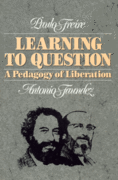In the midst of preparing my learning exercise on women’s studies, curiosity and the pink sneaker, I came across an interview with Paulo Freire entitled “The Future of School.” Check out what he has to say about curiosity, the pedagogy of the question and not being a good boy:
I am the antagonist of pedagogy. I am the antagonist of epistemology. I am the opposite ethic. I am nothing of that, because I am the antagonist of that. And I insist, I don’t like discourses. I am not a “good boy.” I try to be a good person, but “good boy” — God forbid! If you want to hurt me, call me a “good boy.”
I am an educated person, very educated, polite, disciplined, and courteous. That I am, indeed, and more. I try to be respectful, but “good boy,” for God’s sake, no! So I am antagonistic to all this. I am contrary, the opposite of all this. I believe in the pedagogy of curiosity. That’s why I defend, along with the Chilean philosopher Fagundes, the pedagogy of the question and not of the answer. The pedagogy of the question is the one that is based on curiosity. Without that pedagogy there would not be a pedagogy that augments that curiosity.
 After reading this brief excerpt from the interview, I was curious: what is the pedagogy of the question? The idea of asking lots of questions is central for my own pedagogical practices, particularly in my feminist debates class; the final part of this entry exemplifies this approach. I became even more curious when I found Freire’s book, Learning to Question. Now I just need time to read it and think about it in relation to my own practices and ideas about the question/questions. Maybe I will even assign part or all of this book to my students next fall in my Feminist Pedagogies course?
After reading this brief excerpt from the interview, I was curious: what is the pedagogy of the question? The idea of asking lots of questions is central for my own pedagogical practices, particularly in my feminist debates class; the final part of this entry exemplifies this approach. I became even more curious when I found Freire’s book, Learning to Question. Now I just need time to read it and think about it in relation to my own practices and ideas about the question/questions. Maybe I will even assign part or all of this book to my students next fall in my Feminist Pedagogies course?
Another part of Freire’s brief remarks intrigued me as well: the deliberate way he distinguishes between the “good person” and the “good boy”. Here the good boy seems to be a direct reference to the good student who always obeys the teacher, complies with their demands and passively absorbs information without questioning or challenging it. For Freire, not being a good boy does not suggest that one is a bad person, that is rude or disrespectful (a disciplinary problem, perhaps?). Now, what is Freire doing with this statement? Is it merely a move to prove his respectability as a teacher, scholar, person–see, just because I ask questions doesn’t mean I am a bad person, a delinquent!? Or, could he be doing something more here (or maybe could we do something more here) with this distinction? In opposing the “good boy” with the good person, Freire could be suggesting that in order to be a good person, one must necessarily question and be curious; one must not be a good boy. So, to be a good boy is to not be a good person? Hmm…I need to think about this some more.
Note: I think it is significant that he describes it as not being a good boy (as opposed to being a bad boy). This sounds a lot like my discussion of Foucault’s notion of not being governed in certain ways or my discussion of Butler’s idea of asking why as a form of not-obeying. Excellent. What connections can I draw here?

Comments are closed.